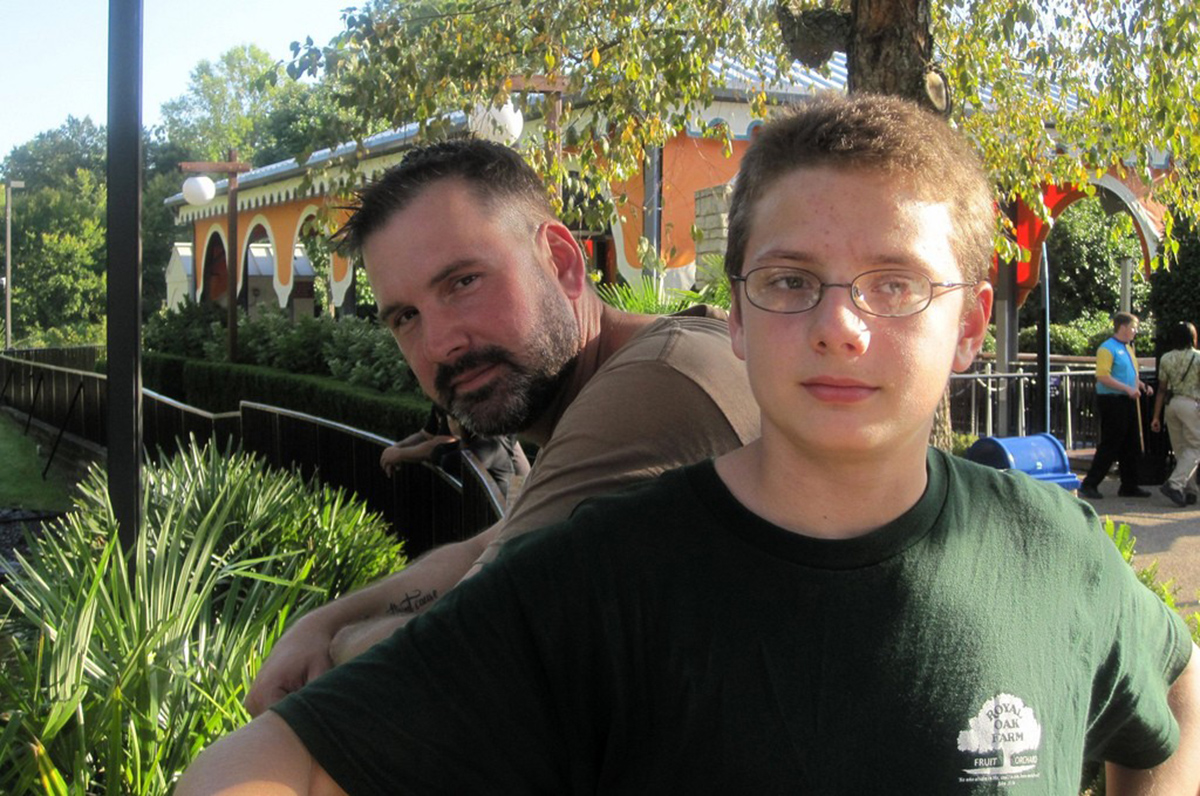Shouting matches, boyfriend and girlfriend drama, staying up till 6 am, alcohol, drugs, slammed doors, unwashed laundry, refusing to do chores, and perhaps teenage pregnancy. These are all things that may come to mind when you hear the word "teenager". Modern Western parents seem to have been equipped with a strong cultural expectation that their sweet little kid will turn into a monster as soon as they become a teen, and that the teenage years will destroy their relationship with their child as well as their own sanity.

Does it really have to be that way? You may be the slightly anxious parent of a tween, dreading the upcoming teen years. You may be the parent of one or more teenagers, and could already be stuck in the drama trap. I spoke to a bunch of mothers of teenagers and adult children, all of whom have a fantastic relationship with their youngsters, to find out what their secret is.
"My teens are great. No drama and no fights," one said. "Our son was an amazing teen who was mostly wonderful to be around," another shared. "We have a good relationship. There is drama, but nothing that makes me think teens are horrible," yet another one said. Then there was a mom who described her teen boys as "the exact opposite of the stereotype" and added that her teens are "kind, caring, responsible and interesting."
Accept Your Teen Isn't A Kid Any More
You remember the days when your child was dependent on you for everything like it was yesterday, and you could — like some parents — still be mentally stuck in those "good old days". Some parents of teens would still really like to tell them which friends to have, what to wear, how to behave, and what to think, believe, and feel. Those days are over. Your teen will be an adult really soon.
What does that mean? Part of it is practical. Teens usually don't need their parents to make all their decisions and do all their chores anymore. They can definitely do their own laundry, but they can also decide which car to buy or complete college application forms on their own, the moms I talked to said. Another part is emotional. Now that your kid is a teen, you can have exciting, grown-up conversations about serious issues. The teen stage is definitely the time to start talking with your kids, rather than at them.
Treating your teen as the young adult they are means respecting them as an individual, who is capable of making choices — choices that are sometimes (and perhaps often) going to be different from the choices you might make.
Treating your teen as a young adult also means respecting their need for privacy. It's great if they want to talk, but they may not want to talk about everything and that is usually totally OK.
See Also: How to Deal with a Teenager as a Single Parent
Lauren, whose two boys are now grown up, put it like this: "If you are a controlling person who thinks you're always right, and you over-react to every little thing while neglecting to really listen to your teen, you'll get a teen who hates you and who will get away from you as fast as they possibly can."
Ruth says: "I treat my 16-year old as a young adult, and she has a lot of freedom because she is very responsible and has earned it. No, we don't agree all the time! That would be creepy and unhealthy! Not only isn't she a kid any more, she is also not me. There are still times when my teens feel misunderstood or they feel very emotional. We talk about it. That's what you would do if your partner felt emotional or misunderstood."
'Less Lecturing, More Listening' And Other Gems
Take The Time To Listen
"Less lecturing, more listening" naturally flows from the acceptance that your teen isn't the little child they once were now. All too often, "being a parent" is synonymous with holding long lectures — rather than listening to what our kids really think and feel. Dorothy, who has a 20-year old daughter, says that doesn't work.

She says: "When they mess up, let them know you're aware they messed up and give them the chance to fix it, giving them appropriate guidance. Don't do hour-long lectures on what a mess-up they are. Offer them a safe place to come to when they mess up, and brainstorm together with them rather than telling them what to do. You'll be surprised what solutions they come up with if you just listen and acknowledge what they say. When you give them some credit, they'll do better and feel better, and you'll have a better relationship."
Don't Freak Out
Listening carefully has another really important component, and that is to stay calm. By creating a safe place in which teens are able to talk about anything that's on their mind, you encourage your teen to make use of that opportunity. In turn, knowing your teen and their life well makes for a healthier and happier teen.
Sometimes it's parents who inadvertently create all that drama, by freaking out (AKA over-reacting) about the things their teen is dealing with.
So go on — have those conversations about sex, your teen's wish to move to the other side of the world, or their friend's brush in with the law. "We do deal with lots of drama, and I am part of the drama but the drama isn't directed at me. My teens use me as a resource," Jane says.
Be Your Teen's Friend
The idea that our children should not be our friends is very dominant in Western society. Some parents believe they can be their kids' friend as well as their parent, and that being friends with kids during the teenage years makes being friends with adult children much more natural.
See Also: My Teenager Hates me - What Should I do?
Lu shared: "My parents always made it clear they weren't my friends, but my parents. Guess what happened when I didn't need parenting anymore? The whole basis of our relationship was gone, and we don't speak much now."
She continues: "Don't get me wrong; I love my parents. But I decided to be my kids' friend as well as their parent, and taking the time to really listen to them is an important part of that." Does this create obnoxious monsters? Quite the opposite. Lu's now grown kids respected her during the teen years, and they have a great relationship now as well.
More Tips On Parenting Teens
Pick Your Battles
The moms I spoke to repeatedly told me about the importance of "picking your battles". "I think about whether an issue is important enough to spend time and energy on changing it," Jamie says. "Like messy rooms. I don't like that. I don't want dishes everywhere and dirty laundry piling up. But in the grand scheme of things, it's just not that important," she says. So she talks to her teens about it, but "I don't impose sanctions or nag endlessly if they forget."

Why? "Not sweating the small stuff means it's easier to deal with the big stuff. I come across more clearly and am taken more seriously when I do say no. When we have a disagreement about a big issue, my teens do ultimately accept my decision. I like to think that has a lot to do with not having 'no' as the default answer in our house."
Dorothy says everyone has bad days, teens included. She sometimes has less patience than she should, and yells at her teens and husband for silly reasons. That's why she doesn't address "every snotty reply, or every instance of bad behavior". Punishing teens for little things when they are already feeling down or having an emotional day backfires, she believes.
Respect Their Individuality
"We recently went through the college application process," Ruth said. "There was a lot of stress. The important thing was to recognize that the behavior that came with the stress was not about me, and not about our relationship. It was about my daughter and her future."
Her daughter ended up making a different choice to the one she might have made, but she dealt with everything competently. "Taking a step back and being there to talk and commiserate without stepping in to give advice or solve the problem has been healthy for our relationship," Ruth is sure.
Lu remembers arguing with her mom about the color of her room. She wanted it one color, but her mom wanted to decide what color it should be. She also fought her mom about clothing choices, and these fights are still fresh in Lu's memory now. This is a big reason she respects her kids' individuality now. "I let them be who they are. I don't tell them what to wear, how to decorate their rooms, or what music to listen to."
Teach Responsible Decision-Making
This approach involves equipping them with the cognitive tools and moral compass they need to navigate life's complexities and challenges effectively. It's not merely about listing guidelines or rules but instilling a mindset and skillset that promote thoughtful, informed choices.
One key facet of responsible decision-making is cultivating critical thinking skills. Adolescents are encouraged to analyze situations, explore various options, and carefully consider the potential consequences of their choices. This empowers them to approach decisions with a deeper level of understanding and foresight.
Furthermore, responsible decision-making encompasses problem-solving abilities. Teens learn how to identify challenges or obstacles, set achievable goals, and develop strategies to overcome them. This skill helps them tackle real-life situations with confidence and resilience.
Understanding the consequences of their actions is fundamental. Adolescents grasp that each choice, be it small or significant, carries its set of outcomes, both positive and negative. This awareness fosters a sense of accountability and encourages them to make decisions more thoughtfully.
If They Do Misbehave, Check What's Wrong
"If your teen does misbehave for long periods of time," Dorothy says, "don't simply write it off as teen hormones." Many of the tips the mothers I spoke to shared overlap — this one essentially comes down to listening to your teen, and making sure you set up an open relationship in which they feel able to share the deep stuff. It's important enough to mention separately though.
Those parents whose teens did become aggressive, sullen, and uncooperative and withdrawn all found out that their teens were dealing with rough things in life. In one case, the teen had been influenced by a bad crowd of friends in school, something the teen herself was uncomfortable with too. Another teen turned out to be facing sexual abuse, while a third was later diagnosed with depression.
No parent wants their teen to go through serious issues like these, but they can and do happen. Looking beyond teen hormones can't just save your relationship with your teen, it might also get your teen out of a situation they can't handle on their own.
See Also: Cellphone Calls And Parent-Teenager Relations
Be Willing To Apologize
Teens are people with quirks and faults, and your relationship is going to be much better if you accept that fact. There's another side to this as well, and that is accepting that you are not perfect either.
This one basically speaks for itself, yet many parents are unwilling to apologize when they are the ones to mess up. They are afraid, perhaps, that doing so is the same as giving their authority away. That doesn't happen, according to the seasoned moms. Teens know when you mess up, and they'll respect you more if you are honest enough to acknowledge that.
- Photo by shutterstock.com
- Photo courtesy of Tony Alter by Flickr : www.flickr.com/photos/78428166@N00/5070925057
- Photo courtesy of J.K. Califf by Flickr : www.flickr.com/photos/emerycophoto/4912553582

